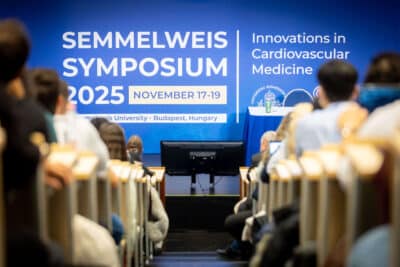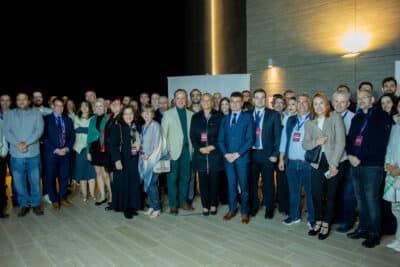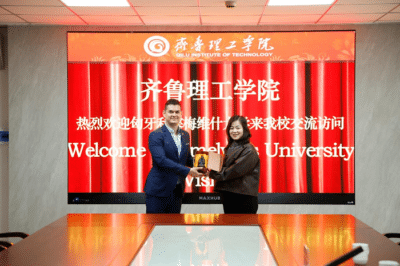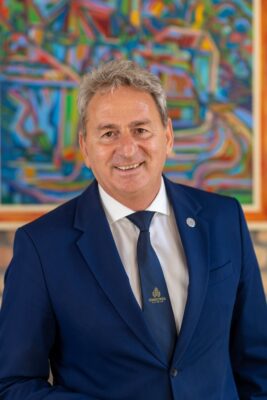 According to Dr. Marcel Pop, Director of International Relations at Semmelweis University, in order to reposition Semmelweis University in the international higher education area, the university’s leadership recognized the opportunities in internationalization and thus strongly supported efforts to build cross-border networks.
According to Dr. Marcel Pop, Director of International Relations at Semmelweis University, in order to reposition Semmelweis University in the international higher education area, the university’s leadership recognized the opportunities in internationalization and thus strongly supported efforts to build cross-border networks.
Director Dr. Marcel Pop believes that Semmelweis University’s complex activities have had a significant impact on healthcare systems globally: “For more than 40 years, we have been training doctors and healthcare professionals from 119 countries; our mobility programs make it possible for hundreds of students, teachers, and researchers to visit us and our partner institutions every year; and our publications have earned us visibility and recognition all over the world. As a result, our university’s international embeddedness, international relationship network, and cooperation system are dynamically expanding and improving. The international student body is constantly growing and diversifying, with more and more courses offered in English and German. We implement several research projects in cooperation with international partners; consequently, our scientific output is constantly growing, and we host more and more international conferences and symposia.”
All of these combined result in strong international visibility, as well as a regional or even global presence, since, as Dr. Marcel Pop highlights it, “international students graduating here, together with visiting lecturers, researchers, and health professionals, take the knowledge they have acquired at Semmelweis University back with them around the world.” In addition, the university also has an international impact on clinical care through health professionals coming here from abroad for shorter or longer internships or training courses, the director pointed out. As a specific example, he highlighted Harvard Medical School’s program at Semmelweis University, which had the potential to improve clinical research and thus the quality of life in the Central and Eastern European region.
He added that in the past five years, the number of cooperation agreements had reached 240, adding to the list of long-standing German and American partners such leading higher education institutions as Harvard University, Oxford University, King’s College London, the National University of Singapore, and Tokyo Medical University.
In addition, existing international partnerships are further deepened: The consortium agreement with 11 European member universities of the EUniWell Alliance, of which Semmelweis is a founding member, and the EUniWell Seed Funding Program were extended. On September 18, Semmelweis University will also organize the closing conference of the Horizon 2020 #Research project under the auspices of the alliance, followed by an international forum on health and well-being on September 19 in Budapest, jointly organized with Times Higher Education, Dr. Marcel Pop highlighted.
Expanding opportunities through international mobility
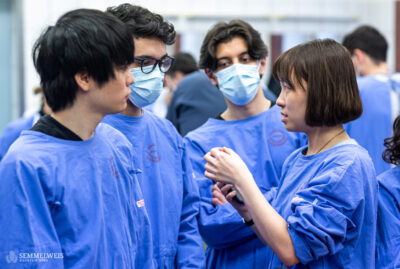 One of the main areas of activity at the Directorate of International Relations is to provide mobility opportunities for students, teachers, and staff, supporting them in gaining experience abroad. The number of studies abroad has also shown a significant increase of 32 percent over the last five years. Furthermore, the contracted amount under the framework agreement has doubled, allowing the directorate to allocate HUF 660 million to support international mobility in the coming years. Dr. Marcel Pop highlighted the Pannonia Scholarship Programme, available from July 1, 2024, which allows better use of existing partnerships not only within Europe but also beyond the continent. The excellence scholarship within the program facilitates mobility to the world’s top 250 universities with an increased amount of funding.
One of the main areas of activity at the Directorate of International Relations is to provide mobility opportunities for students, teachers, and staff, supporting them in gaining experience abroad. The number of studies abroad has also shown a significant increase of 32 percent over the last five years. Furthermore, the contracted amount under the framework agreement has doubled, allowing the directorate to allocate HUF 660 million to support international mobility in the coming years. Dr. Marcel Pop highlighted the Pannonia Scholarship Programme, available from July 1, 2024, which allows better use of existing partnerships not only within Europe but also beyond the continent. The excellence scholarship within the program facilitates mobility to the world’s top 250 universities with an increased amount of funding.
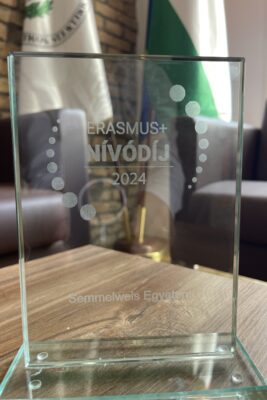 In 2014, upon the director’s urging, the university joined the Stipendium Hungaricum Scholarship Programme, which is thus managed by the Directorate of International Relations within the university, providing students from 90 countries around the world with the opportunity to study in Hungary and at Semmelweis University. The number of participants in the program has increased ninefold in the past five years, and exceeded 400 in the academic year 2023-2024, which, in addition to attracting significant government support, is “one of the most significant and powerful internationalization tools of the past 10-15 years,” the director believes.
In 2014, upon the director’s urging, the university joined the Stipendium Hungaricum Scholarship Programme, which is thus managed by the Directorate of International Relations within the university, providing students from 90 countries around the world with the opportunity to study in Hungary and at Semmelweis University. The number of participants in the program has increased ninefold in the past five years, and exceeded 400 in the academic year 2023-2024, which, in addition to attracting significant government support, is “one of the most significant and powerful internationalization tools of the past 10-15 years,” the director believes.
In recognition of its outstanding work, the Directorate’s International Mobility Office received the Award of Excellence from the Tempus Public Foundation in May 2024.
Growing portfolio: international short programs
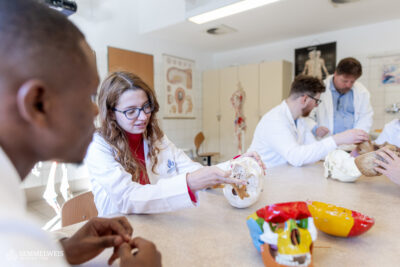 The university’s recognition in international rankings has also increased interest in extra-curricular short courses and training opportunities. At first on an ad hoc basis, and later in a structured format, university faculties experienced interest from mostly Asian, Middle Eastern, and North American countries to participate in fee-based extra-curricular training courses, which typically last from 2 weeks to 3 months, and are available in theoretical, research, or clinical fields. Among the short programs offered by the university, the cadaver courses are considered unique at the international level as well. As short programs and study tours are not aligned with the university curriculum, their implementation and integration into regular university operations require coordinated financial, administrative, and organizational solutions, emphasized Dr. Marcel Pop.
The university’s recognition in international rankings has also increased interest in extra-curricular short courses and training opportunities. At first on an ad hoc basis, and later in a structured format, university faculties experienced interest from mostly Asian, Middle Eastern, and North American countries to participate in fee-based extra-curricular training courses, which typically last from 2 weeks to 3 months, and are available in theoretical, research, or clinical fields. Among the short programs offered by the university, the cadaver courses are considered unique at the international level as well. As short programs and study tours are not aligned with the university curriculum, their implementation and integration into regular university operations require coordinated financial, administrative, and organizational solutions, emphasized Dr. Marcel Pop.
This spring, having streamlined its new role, the directorate simplified the application process to its international short programs and made it available on its website in a new format.
This summer, Chinese students took part in a four-week theoretical and clinical training course in the framework of such a short program. In the near future, the Faculty of Dentistry and the András Pető Faculty will also welcome students in this format, so this portfolio will be continuously expanded and strengthened, as the director outlines the plans.
The new short video and the new mission statement of the directorate aim to represent this clarified vision and streamlined portfolio, which is extended with new tasks and co-workers.
With the motto ‘Semmelweis for Global Health’ and an animation representing Semmelweis University’s worldwide network, we want to convey the message that through the trinity of our partnerships, mobility opportunities, and our range of programs, it is not only us who make an impact around the world, but those who come to us also have a reciprocal impact on us. – Dr. Marcel Pop.
“We are shaping the image of Semmelweis University abroad with events such as film screenings, graduation ceremonies for our outstation degree programs, alumni meetings, or the Heidelberg-Freiburg-Semmelweis symposium in Germany this September. This is one of the reasons why people from all over the world come here with great enthusiasm to exchange knowledge and experience, as well as to learn and collaborate with our professionals,” he said.
Photos: Directorate of International Relations; illustrations: Attila Kovács – Semmelweis University
